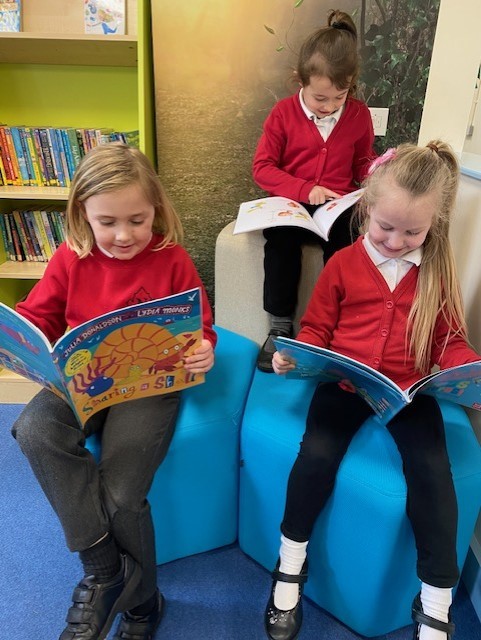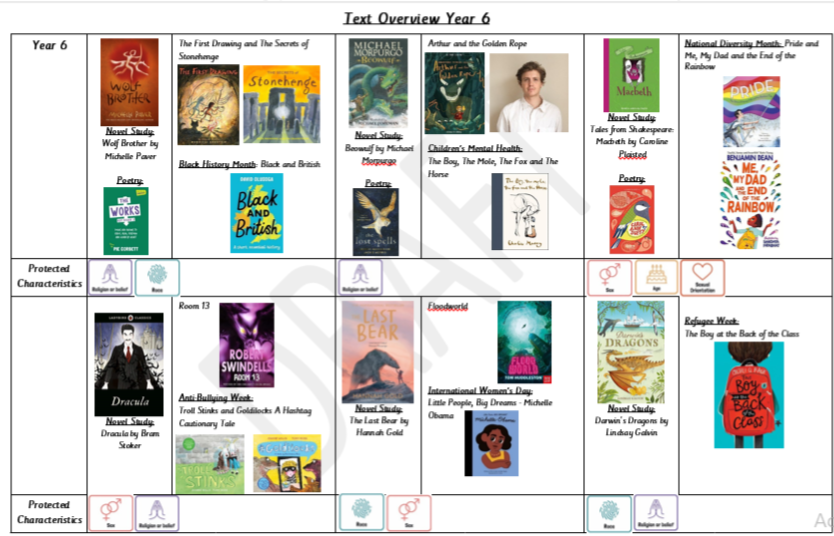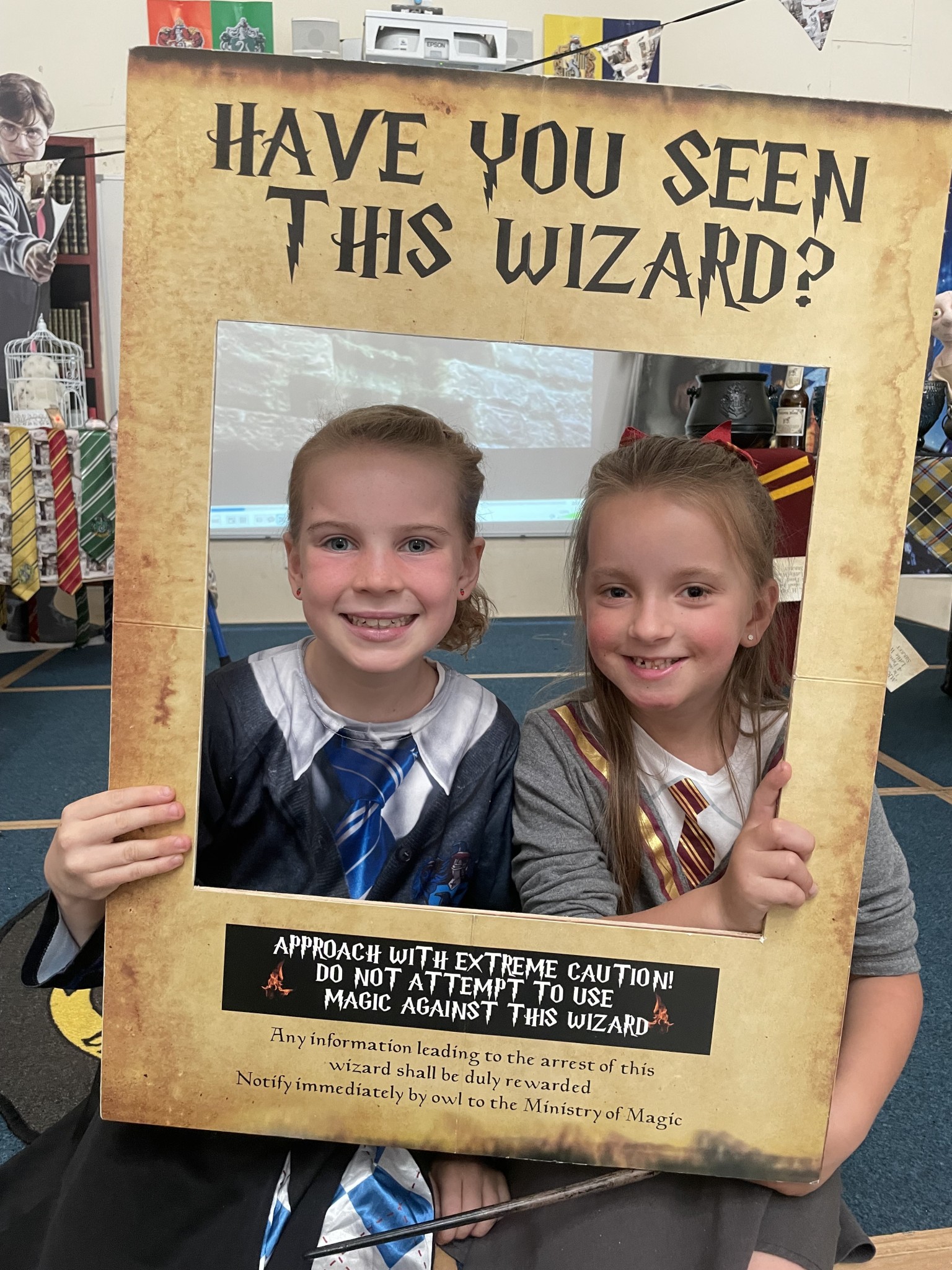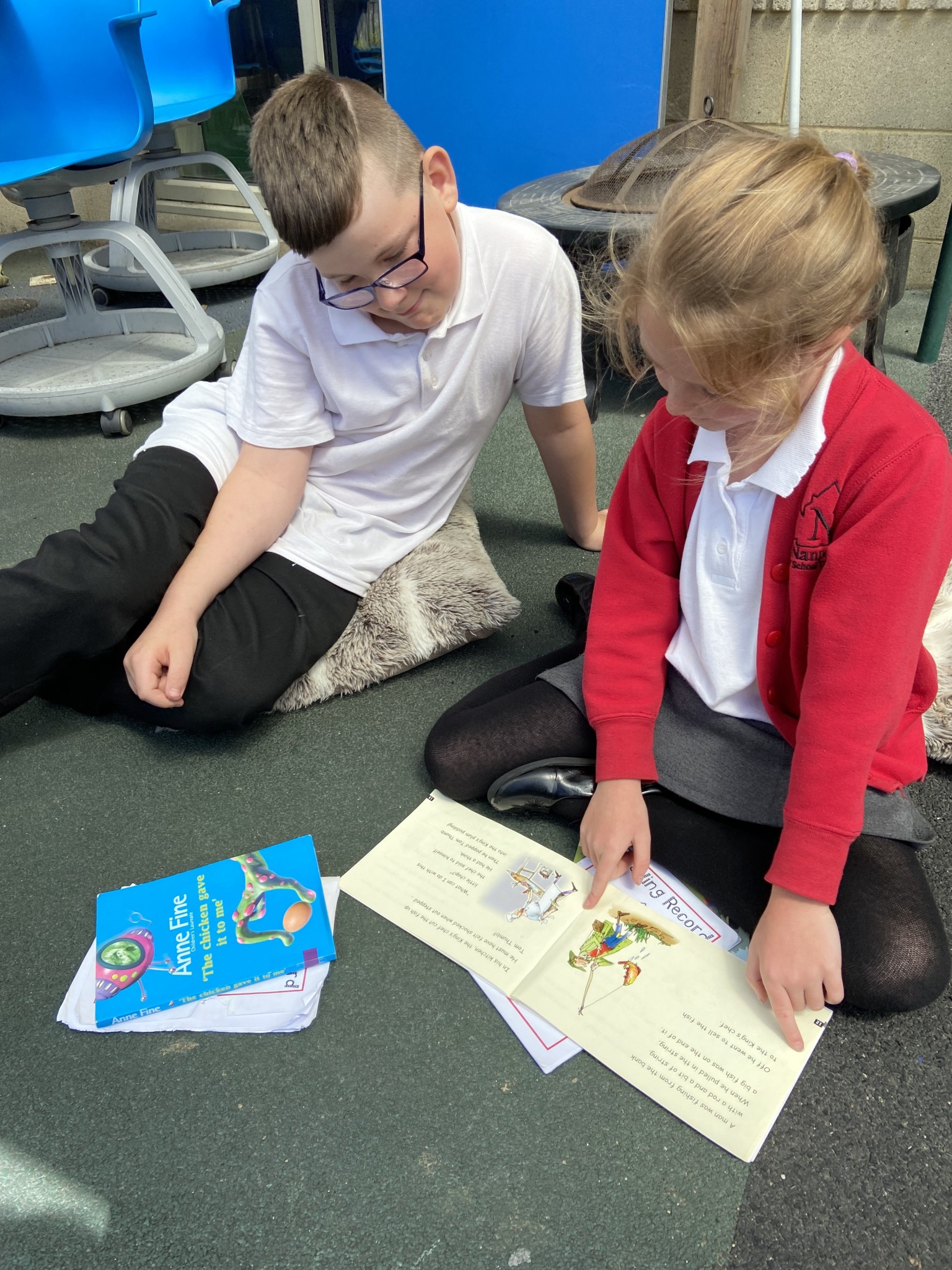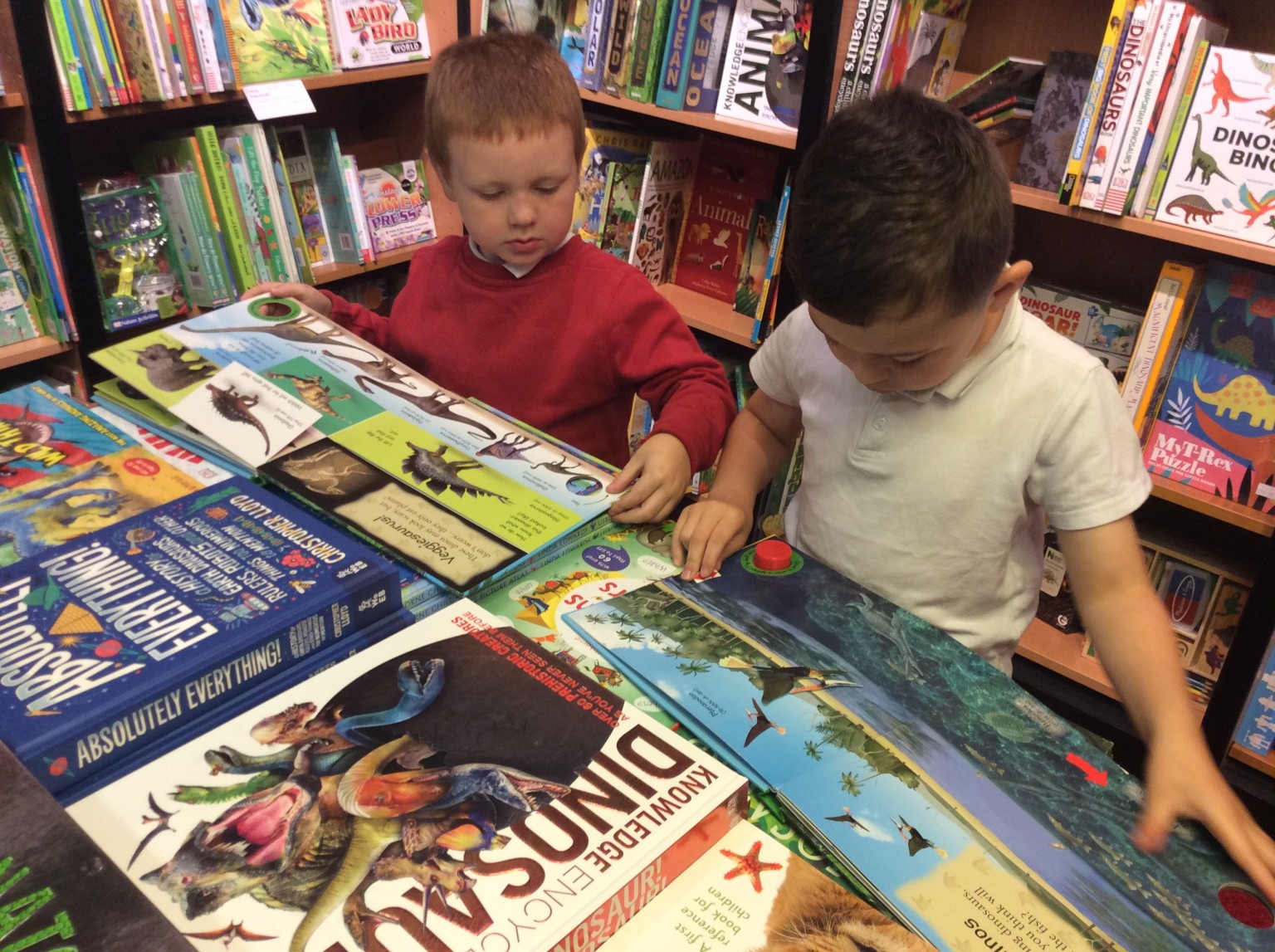INTENT
At Nanpean School, we understand that reading is a lifelong skill and is therefore given the highest priority. We aim for our pupils to learn to read quickly and effectively so that they can access learning in all areas of the curriculum. Learning to read is the foundation for all educational and future success. Teachers support reading in all subjects to support pupils’ acquisition of knowledge. Pupils are taught to read fluently and encouraged to read for pleasure through accessing high-quality literature in our school library. As a school, we have ambitious expectations for reading at home through our Reading Challenge.
We are determined to support every child to learn to read at Nanpean School and therefore aim to support our pupils to:
- Apply a knowledge of structured synthetic phonics in order to decode unfamiliar words with increasing accuracy and speed;
- Read accurately and fluently
- Understand the meaning of what they read and what is read to them.
- Give our children the reading skills they need to access all areas of the curriculum.
- Gain a life-long enjoyment of reading and books.
IMPLEMENTATION
Reception
In the Foundation Stage children follow the Early Years Foundation Stage Curriculum. Language and literacy development are incorporated in all areas of learning. Opportunities are provided for children to communicate thoughts, ideas and feelings. Purposeful role-play is used to develop language and imagination. Children are given opportunities to share and enjoy a wide range of rhymes, songs, poetry and books. An environment is provided which reflects the importance of language through signs, notices and books. English is taught both as a discrete subject and within the whole Early Years Curriculum to give children opportunities to use their English skills in real life situations. In addition to the English teaching, there are also daily systematic synthetic phonics sessions using Read, Write Inc.
The teaching of reading at Nanpean School develops pupils’ competence in both key areas (word reading and comprehension) and different teaching approaches are used for each.
Phonics (Read, Write, Inc)
Reading is a fundamental part of everything we do at Nanpean School. Phonics is taught using the Read Write Inc programme which will allow children to decode text fluently. Read Write Inc., developed by Ruth Miskin, provides a structured and systematic approach to teaching reading. It continues to build on the children's growing knowledge in a systematic way and close tracking of individual achievements ensures no child is left behind. All children in EYFS and KS1 receive daily phonics teaching which combines the teaching of sounds required with the introduction of texts, linked to the children's level of development. We start teaching the set 1 single letters sounds during the first full week of Reception Class.
Using RWI, the children learn to read effortlessly so that they can put all their energy into comprehending what they read. It also allows them to spell so that they can put all their energy into composing what they write. Children from Year R to Year 4 will remain on the programme until they can read 90+ words per minute at grey level. Children in year 5 and 6, who have not completed grey level, will move onto Fresh Start intervention. When using RWI to read the children will:
- Learn 44 sounds and the corresponding letter/letter groups using simple picture prompts
- Learn to read words using Fred Talk
- Read lively stories featuring words they have learned to sound out
- Show that they comprehend the stories by answering questions.
When using RWI to write the children will:
- Learn to write the letters/letter groups which represent 44 sounds.
- Learn to write words by saying the sounds in Fred Talk
To ensure best practice, we have development days led by the Ruth Miskin RWI trainers. Their aim is to provide high quality insight and advice to enable us to develop our own excellent practice in teaching reading through systematic synthetic phonics and early language, and encouraging a love of reading among our pupils. As well as this, the phonics lead provides weekly coaching sessions and provides staff CPD using the online portal.
Novel Study:
At Nanpean School, we understand that reading is the foundation for all educational and future success. Teachers support reading in all subjects to support pupils’ acquisition of knowledge. Pupils are taught to and encouraged to read for pleasure through accessing high-quality literature in our Novel Study lessons. These happening three times a week in KS2 and twice a week in KS1. The books chosen for these sessions cover genres from the National Curriculum as well as covering the nine protected characteristics. As well as this, books are chosen to compliment other areas of the curriculum as well as awareness events. Novel Study lessons are used for the teacher to model reading as well as children listening to each other. After reading sections or chapters, discussion will take place using the question stems. Children are not expected to write anything down in these lessons, but the back of reading books can be used as a jotter when needed.
Reading Comprehension
School has always taught comprehension alongside all other strands of reading. At present, despite gains in phonics outcomes, reading assessment outcomes at end of key stage and in all year groups are still not good enough. Children can read but they can’t comprehend to the same level. End of key stage assessment always indicates that children can’t read the test texts fast enough despite the majority having reached the desired speed of 90 words per minute to complete RWI Grey group.
Therefore, school has developed a systematic approach to teaching comprehension skills and fluency in reading beyond the phonics programme. The system needs to be less reliant on repeated practice and exposure to text to gain improvement and move to a model of repeated and consistent direct teaching of reading skills with accurately pitched practice for fluency and question response.
Analysis of content domain indicates that retrieval, vocabulary and inference far out way prediction and summary in importance for assessment and therefore the weighting of teaching and question practice will reflect this in all lessons. Vocabulary will be a constant in all lessons. Questions for children who have just finished RWI will be weighted towards retrieval. Secure retrieval skills are the next step. Inference questions will be phased in as children move through the system.
Secure reading skills from RWI enable children to develop secure retrieval skills in comprehension which enable children to infer meaning from what they have retrieved.
The comprehension lesson is 30 minutes long and takes place 3 times a week at the same time that KS1 are doing phonics. This enables children to be mixed in to ability groups at whole school level. The existing frequency of shared reading which covers all VIPERS and is aimed at enjoyment and engagement is maintained, independent reading through AR Time and daily teacher reading is maintained.
Reading Intervention
Progress and attainment of all [pupils is closely monitored and provision is put in place where needed. In KS1, fast-track tutoring is used with pupils who are not making the expected progress of the Read, Write, Inc. programme. In KS2, fast-track tutoring and Fresh Start is used with pupils who are not fluent enough in reading to fully access the curriculum.
Reading at home
Children take home a book daily, which they are encouraged to share with their parent/carers. This begins in Reception and continues through KS1 and KS2. The class teacher monitors this through the school’s reading records.
As a school, we view all reading activities as important. Therefore, pupils can take part in any of the following reading activities:
ü Reading something electronically e.g. Kindle, computer game etc.
ü Reading a non-fiction text e.g. recipe, instructions etc.
ü Reading a comic or magazine
ü Reading a school reading or library book
We expect all children to engage in a reading activity at least 5 times a week. Children that do this are entered into a weekly book raffle.
Parents and children need to record their reading at home in their reading record. Children have their reading records checked in school on a Tuesday. If a reading record is not frequently signed, in the first instance the class teacher speaks directly to the parent or carer. In addition, termly letters are sent home to families who are not engaging enough with reading activities at home. These letters outline the importance of regular reading practice at home. Following this, if reading engagement does not improvement, the English Lead or Headteacher will make contact with the family.
Accelerated Reader
Accelerated Reader gives teachers the information they need to monitor students’ reading practice and make informed decisions to guide their future learning. Children in year 2 (who have completed the Read, Write, Inc. programme) upwards take a STAR Reading test every half-term. This assessment gives each child a reading age, scaled score and a ZPD level. Pupils develop reading skills most effectively when they read appropriately challenging books – difficult enough to keep them engaged but not so difficult that they become frustrated. This is their ‘Zone of Proximal Development’ (ZPD). As pupils are retested every half-term, their ZPD ranges increase and broaden so they continue to read suitably challenging literature.
Students choose a home reading book from their ZPD level. Once they have read it, they take an online quiz and receive immediate feedback. Teachers can also generate reports from these quizzes to see how much a child has been reading, at what level of complexity, and how well they have understood what they have read. Parents have access to Home Connect which allows them to log on to see what their child has been reading and how well they have done in their reading quizzes.
Promoting reading for pleasure and across the curriculum
Many other opportunities are provided for pupils to practise and extend reading in other subjects. All teachers are responsible for providing a stimulating reading environment, promoting book ownership and recommending books to pupils. Classroom and book corners are language rich and special displays promote authors and books. Each classroom has a selection of books which are directly linked to the class learning. This offers opportunities for pupils to apply their reading skills across the curriculum. All children visit the school library weekly and freely choose a book to take home that interests them. Adults act as role-models to pupils and they are read to each day by their class teacher.
At lunchtimes, reading books are available on the hall for children to enjoy when they have finished eating.
IMPACT
Through our approach to reading our children are able to:
- Read a wide range of texts
- Understand and enjoy a wide range of genres
- Decode words fluently
- Possess a broad and deep vocabulary knowledge
- Read fluently, accurately and with appropriate expression
- Develop reading stamina
- Ask appropriate questions
- Read for pleasure

